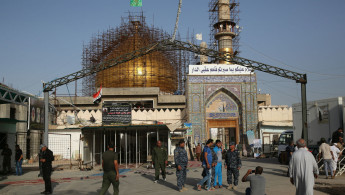Iraqi lawmaker accuses Iran of involvement in infamous Shia shrine bombing
A leader in the political party of Iraqi Shia cleric Moqtada al-Sadr has accused Iran of having a hand in a 2006 bombing of one of the most sacred sites in Shia Islam.
Lawmaker Awad al-Awadi told the local Dijlah TV on Sunday that Iranian militants had infiltrated the country at the time of the al-Askari shrine bombing, which set off a bloody sectarian conflict in Iraq.
Awadi said that Tehran should come under the same level of scrutiny as Gulf states and Turkey for their backing of militant groups.
"Take for example what happened in Samarra, many reports have revealed that there were interests, there were terrorist cells and groups that came in from Iran," the parliamentarian said.
The bombing of the al-Askari shrine in the city of Samarra, north of Baghdad, over a decade ago set off a tsunami of sectarian strife that lasted nearly years and killed tens of thousands of people.
Shia militias, in particular Sadr's Mahdi Army and the Iranian-backed Badr Brigade, attacked Sunnis in Baghdad, as Shias in towns and villages simultaneously came under attack by Sunni militants.
The lawmaker's comments come hot on the heels of a rare visit last week from Sadr to Sunni-ruled regional kingpin Saudi Arabia, a staunch rival of the Shia-dominated Islamic Republic of Iran.
After the visit, he called on the Baghdad government to dismantle the Hashd al-Shaabi umbrella organisation dominated by Iran-backed Shia militias - a demand that was quickly shot down by Prime Minister Haidar al-Abadi.
Sadr, who is seen by many as a nationalist, also called for renewed protests against corruption in the Iraqi government.
His supporters have staged huge protests in Baghdad calling for electoral reform.
Unconfirmed theories of Iranian involvement in the al-Askari bombing have circulated in Iraq for years.
They often allege that Tehan sought to kick off a sectarian war to "divide and conquer" its Shia-majority neighbour.
No group claimed responsibility for the blast, which destroyed the golden dome of the religious site.
The US president at the time George W. Bush accused the Islamic State group's precursor, al-Qaeda in Iraq, of the bombing.





 Follow the Middle East's top stories in English at The New Arab on Google News
Follow the Middle East's top stories in English at The New Arab on Google News
![Israeli forces ordered bombed Gaza's Jabalia, ordering residents to leave [Getty]](/sites/default/files/styles/image_330x185/public/2176418030.jpeg?h=a5f2f23a&itok=_YGZaP1z)

